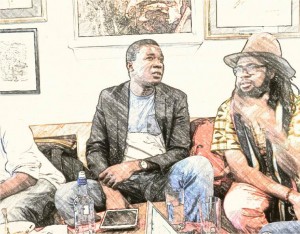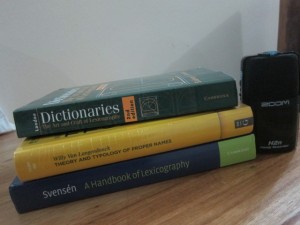Guest Post by Luis Morais
Languages as cultural and social institutions of their peoples can either flourish, evolve and thrive or stagnate, degrade and die. There are several causes and factors that contribute to the death of a language, we could simplify things by stating that languages either die by the force of oppression (from man or nature) or by assimilation: when speakers start using a foreign language more than their own, up to the point that the dominant language swallows the regional language.
UNESCO rates how far a language is to extinction by quantifying the number of new young speakers learning and using it actively both inside and outside their homes. It is a straight-to-the-point system but it exclusively evaluates language “health” from the perspective of its spoken use without a deep consideration of how actively the regional language is used as a tool for knowledge creation instead of the dominant foreign language and how motivated regional speakers feel to preserve the knowledge acquired from previous generations.
Most African languages nowadays are safe from violent repression and technically considered alive due to the numbers of their many speakers. Nevertheless, since the world trend is that we will grow more and more dependent on digital technologies, we must consider the growing pervasiveness of the digital and online world in Africa either as:
- An opportunity for African languages to gain their space in the online world and thrive in the digital age;
- Or, where languages fail to establish an online and digital presence, the speeding up of the assimilation process where the local language is pushed out of yet another environment by the dominant language with the side effect of further eroding local speakers’ opinion of the language as useful and relevant for the digital age.
Knowledge is much wider than gadgets, corporations and factory plants
This article expands the focus of language health and longevity from new speakers learning the language and number of oral speakers to how actively the local language is used to create and preserve knowledge in the digital age. So that we are clear, whilst some view knowledge as exclusively what corporations, academic institutions and factories churn out every year, we base our argument on the fact that knowledge is much wider than that.
Within every language a trove of knowledge is to be found in the form of myths, poetry and literature, gastronomy, spirituality, herbs and natural medicines, philosophy and untranslatable concepts, music and new sounds, art, child upbringing methods, moral concepts, ways to govern and live in society, forms to express feelings and everything else.
In the oral tradition of Africa, it potentially resides a) the basis of the advances we enjoy today, b) the leads to future breakthroughs, c) but most importantly the blueprints of a sustainable way of life in this broken planet. This knowledge, essential and valuable as it is, must be preserved for the sake of the hidden lessons we might still learn from them.
If one thing, and one thing only, Africa should learn from Europe is fostering one’s own local languages
Although Africa is the home of the oral tradition, the historical evidence also shows that Africans from all over the continent have also been writing and recording their knowledge for centuries. Nevertheless, be it in Arabic, Medieval Latin, French or English, Africans from the past and present seem to have produced more physically recorded knowledge in the crusader’s and colonist’s language than in their own local languages.
In Europe, local languages stand a better chance to co-exist (instead of competing) with dominant official languages. Although the pressures of assimilation from other majoritarian European languages are still present, local languages and minority national languages in Europe have possessed a localised digital infrastructure compatible with knowledge creation in the local language for some time now.
The results are clear:
- Catalonia as an autonomous region in Spain with 7 million Catalan speakers, boasts a book catalogue of 56.000 titles. Despite having suffered government repression in the past, nowadays the Catalan language is digitally accessible and content can be easily found online.
- As another notable example, Iceland, with a population of a bit more than 300,000 people publishes 1,500 books in Icelandic every year.
- In the case of Yiddish, one can easily find online book repositories with more than 10.000 free titles.
- In the UK, there is plenty of literature produced in Welsh (430.000 speakers), Irish (2.5 million speakers) and Gaelic (87.000 speakers).
Regional and linguistic identity has always been a European theme, backed by a lucrative regional cultural industry generating millions of Euros. In the African context, it is difficult to foresee how regional languages expect to thrive in the digital age unless regional speakers find the localised tools and motivation to use their local languages in the digital space.
Why aren’t we producing more digital content in African languages?
We contemplate a future where our descendants will learn more of their identity and culture from digital and online sources. These future generations will likely listen to their oral tradition in YouTube, dance to their drums in iTunes and read about their myths in Wikipedia. These future generations will be more and more engaged in living a digital life and used to accessing and sharing information from digital sources.
In order to create local knowledge for these future “digital & online” generations, we first must allow regional language speakers to use their languages whenever and wherever they want. This is hardly possible in Africa today simply because the basic tools such as local keyboards and local digital language features are hard to find if not nonexistent.
Most African languages have poor access to digital aides such as language glossaries, text-to-speech databases, auto-correction and auto-suggestion features amongst other incredibly simple digital advances such as OCR, the technology that allows words in a picture of a book page to be recognised as words.
In simple terms, one can’t create knowledge in their local language without fully accurate and functional language tools.
As a personal example, being a speaker and writer of Brazilian Portuguese, I battled with keyboards to write in my native language when I came to the UK. Portuguese characters such as “ç” and accented letters such as “ã”, “à”, “ê”, “ó”, “ü” were impossible to type in a UK keyboard and for months I didn’t create much in my own language, reluctant to write it in a way that was orthographically wrong and open for misunderstanding.
In order to write in my own language, I tried several workarounds in the first years. I spent time cutting and pasting the accented characters from Brazilian websites into my writings; I installed intrusive virtual on-screen keyboards; and at a time I imported a European Portuguese keyboard which took a lot of physical space since my family still needed the UK keyboard around.
Just when I started using customised keyboard layouts on my UK keyboards then I was able to write from my coração (heart). Just then, I felt intellectually liberated and started creating knowledge in my own language.
Conclusion
Whilst typing machines epitomised the colonist’s oblivion (if not plain hostility) to local language and culture by locking knowledge production to a keypad in the colonist’s language, soft keyboards, computer keyboard layouts and digital language aides give the local speaker the freedom to produce knowledge in as many languages as they want or need.
The technology is here and has been available for some time, nevertheless in order to give regional African languages a fighting chance in the digital age, more needs to be done in order to create easily accessible regional language tools that allow one to exercise their regional language and culture with full digital language support.
I link the low usage of local languages to produce digital and online knowledge to both technological and social reasons:
- There are insufficient localised input tools that allow one to write in their local language correctly.
- Attempts to write the language with an incompatible input tool generates imperfect language content without the right characters, accents and tonal marks.
- Content created without the right orthography dilutes the language. For not being standard it is harder to find in search engines.
- The lack of digital language tools such as glossaries, dictionaries, OCR, auto-correct and auto-suggest features amongst others demotivate less experienced speakers of the local African language.
- By seeing their local language under- and misrepresented in the digital and online world, speakers don’t feel their regional language is relevant for the digital age.
- By being forced to make more effort to write in their regional language correctly, speakers decide not to use it as often as the dominant language to avoid the extra work.
Once the barriers above are removed and local digital language tools are created, part of the mission to allow African languages to represent themselves in the digital world will start to be accomplished in the form of the unblocked production of regional language content. In other words, make the tools for localised knowledge production accessible and everything else will follow.
________
Luis Morais writes from Brazil. This article was first published on LinkedIn here.
________
Bibliography/Further reading
Google’s Vint Cerf warns of ‘digital Dark Age’
http://www.bbc.co.uk/news/science-environment-31450389
How do I address you? Forms of address in Oko – Uchenna Oyali
http://academicjournals.org/article/article1379410255_Oyali%20pdf.pdf
Is Yorùbá an Endangered Language? – Felix Abidemi Fabunmi & Akeem Segun Salawu
http://www.njas.helsinki.fi/pdf-files/vol14num3/fabunmi.pdf
An Endangered Nigerian Indigenous Language: The Case of Yorùbá Language – Temitope Abiodun Balogun
http://nobleworld.biz/images/6-Balogun_s_Paper.pdf
African Languages in a Digital Age, Challenges and Opportunities for Indigenous Language Computing. Don Osborn, HSRC Press.



 I found the project stimulating to work on, hard as the challenge of audio recording was, sometimes across two continents, but it gave me great pleasure, and something worthwhile to work on at that time when academic endeavour as a student looked like a chore with no silver linings. It helped to have had a couple of published materials to use, but researching the meaning of names proved interesting enough to mitigate the boredom of the final years of school. I got my degree, and left the university, with a niggling desire at the back of my mind to one day return to the project in a larger form. The choice was either to find money, call up some of the original collaborators and do it again, this time without the constraints of a university environment, or to simply pursue it as a solo side project. The reality turned out to be that because of other commitments, I would never be able to individually pursue it as a solo project anymore.
I found the project stimulating to work on, hard as the challenge of audio recording was, sometimes across two continents, but it gave me great pleasure, and something worthwhile to work on at that time when academic endeavour as a student looked like a chore with no silver linings. It helped to have had a couple of published materials to use, but researching the meaning of names proved interesting enough to mitigate the boredom of the final years of school. I got my degree, and left the university, with a niggling desire at the back of my mind to one day return to the project in a larger form. The choice was either to find money, call up some of the original collaborators and do it again, this time without the constraints of a university environment, or to simply pursue it as a solo side project. The reality turned out to be that because of other commitments, I would never be able to individually pursue it as a solo project anymore.